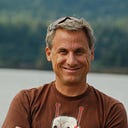Life During Lockdown: Ralph Abraham
I’ve never interviewed my parents before. So why not start now. My father is a prominent mathematician, chaos theorist and world wide web pioneer who taught at UC Santa Cruz for many years. He’s published more books than I can keep track of, and he spent many years developing the innovative curriculum at The Ross School in East Hampton, New York. Recently retired from academic life, he still travels, writes, and skis. While my parents were divorced when I was five years old, and my brother and I lived most of the time with our mom and step dad, our father is responsible for getting us out on skis as soon as we could walk. We spent most of our youth skiing with our dad every chance we could. I’ll be forever grateful for that introduction to the mountains and a lifetime of appreciating the outdoors. You can learn more about him here.
Give me some highlights and lowlights from your first month in lockdown mode.
At first we were scrambling to organize groceries and all that. I expected to have lots of time for math and writing. But after settling in to a new routine, I had very little time for creative work. I am doing lots of home jobs for which I used to have help. On the positive side, I greatly enjoy all the homework, and it is a relief to be free of the busy calendar. Life is stress-free, other than what seeps in from the news. Maybe this my new normal.
How have you grown personally and professionally during this disruption?
Einstein said that creative work is an escape from humdrum. From my new perspective as a stay-at-home senior, I have come to see that my writing hobby has no other role. Actually I am shrinking personally and professionally, and this may be a good thing.
Has your relationship with your work changed as a result of being home alone with no meetings, lectures or travel on the calendar?
My work has taken a welcome turn to the personal. My current book project is not a memoire, yet it is based on personal experiences with psychedelics and meditation. I am trying to convey, through mathematics, the structures of consciousness perceived through introspection. I have written some papers along this line previously, some published in obscure places, but bringing them together in book form is a new direction in my work. It seems that the social distance due to the pandemic reduces the forces of conformity, empowering more boldness in writing. There may be no audience for these ideas, but that is less of a concern than ever.
Can mathematicians, scientists and authors like yourself create positive change in the world during the pandemic?
I am deeply pessimistic. I have been trying to support change, to trigger a major bifurcation, for over 50 years. I have tried alone, and in several wonderful groups. Scientists and artists may fare better. But for me, there is this insurmountable problem. Math is one of the most powerful cognitive strategies for grokking the massively complex dynamical system in which we live. But it is also the least understood.
